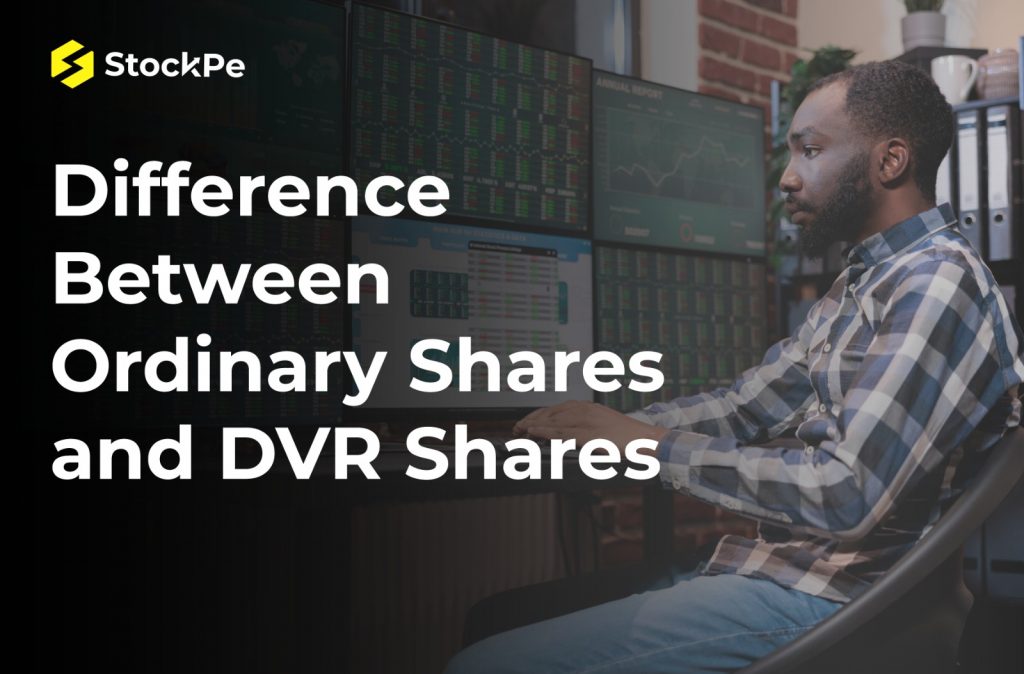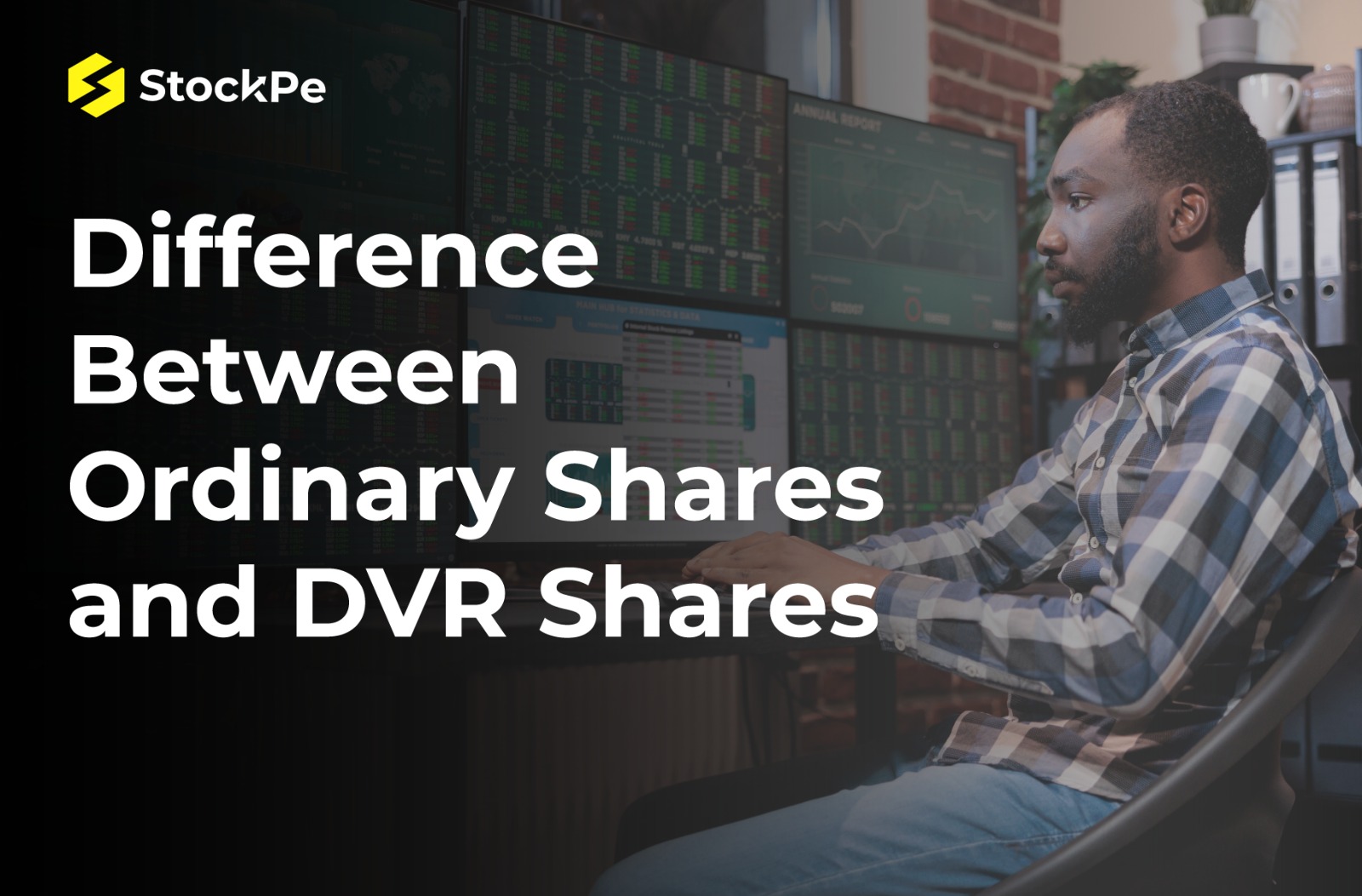What is an ordinary share?
We shall learn more about what an ordinary share is in this piece, along with its benefits and drawbacks for consumers.
Ordinary shares, also known as common shares, are a type of stock that represent ownership in a company. Individual shareholders with ordinary shares frequently have the opportunity to cast a ballot on important corporate matters like the selection of the management board.

In addition to voting rights, ordinary shareholders may be entitled to dividends, which are a portion of the company’s profits delivered to shareholders. But, dividend payments are not guaranteed and may vary from year to year depending on the company’s financial success.
Ordinary shares are unlike other kinds of shares, such as preferred shares, which have different voting rights or are entitled to a fixed dividend payment.
An annual meeting of a company’s shareholders is known as an annual general meeting (AGM). Holding an AGM for businesses is mandated by law in many nations. An AGM is held to give shareholders a chance to voice their opinions on crucial issues affecting the business, learn more about the company’s performance, and ask questions.
The AGM gives shareholders of ordinary shares the chance to participate in the company’s decision-making process. Voting by shareholders is permitted on significant issues like choosing the board of directors, approving financial reports, and approving dividend payments.
The management of the firm often provides a detailed review on the success of the company over the previous year, including financial figures, strategic developments, and other significant updates, at the AGM. Shareholders are free to query management and request explanation on any matters of interest.
In addition to conducting business, the AGM offers holders the chance to interact with the company’s management as well as other shareholders.
In general, the AGM is a significant occasion for regular shareholders as it gives them a chance to take part in the company’s ruling procedure and to keep informed on its performance and plans.
The right to vote on corporate matters at shareholder meetings, such as annual general meetings (AGMs) and extraordinary general meetings (EGMs), is referred to as voting power for ordinary shares (EGMs). Ordinary shares normally have one vote per share, therefore a shareholder’s voting power increases with the number of shares they own.
A shareholder, for instance, would own 10% of the voting power in the company if they owned 100 of the 1,000 ordinary shares that the company had issued. A shareholder’s vote counts for 10% of the total votes if a question is presented to a vote at an AGM.
Ordinary share voting power is an important part of shareholder rights and corporate governance. It allows shareholders to participate in the company’s decision-making process and affect the company’s strategic direction.
Specific stockholders may have disproportionate voting power in comparison to their economic ownership of the company in specific situations. This can happen, for example, if the corporation issues shares with multiple voting rights classes, or if a shareholder owns a large number of shares with higher voting rights.
Consequently, voting power of ordinary shares is an important part of stakeholder sovereignty since it enables owners a significant say within the company’s business and agenda.
Different types of ordinary share:
As a stock market investor, you are inevitable to come across and maybe trade in several sorts of ordinary shares. While they are the most common types of shares in the market, ordinary shares can be further classified according to their particular characteristics. Here are a couple of them in more detail:
Voting/non-voting ordinary shares– These varieties of ordinary shares decide how much a shareholder has a say in significant decisions affecting a company’s policy. Whereas voting shares provide such voting rights, non-voting shares provide possession but just limited or no voting powers.
Sweat equity shares– These are typically offered by companies to employees and senior executives as a form of compensation or incentive.
Right shares– Current shareholders in a financial institution are given the option of purchasing additional ownership stakes before they are available for trade in the market. These are referred to as right shares.
What is DVR shares?
This essay will go into further detail regarding what an differential voting rights, as well as the benefits and drawbacks it offers clients.
DVR (Differential Voting Rights) (Differential Voting Rights) Shares are a sort of equity share that allows shareholders to vote differently. As a result, certain stockholders may have greater voting power than others.
In a corporation with DVR shares, for example, one shareholder may have one DVR share with ten voting rights while another shareholder has one conventional share with one voting right. This permits certain shareholders, typically founders or promoters, to retain greater control over the company despite having a reduced ownership interest.
DVR shares are often issued in nations like India, where they are regulated by the Securities and Exchange Board of India (SEBI).
Companies are thought to be able to generate finance while still maintaining control over crucial decisions by issuing DVR shares. Nonetheless, there has been some debate about the usage of DVR shares, with some critics contending that they offer some shareholders an excessive amount of control and threaten the idea of shareholder democracy.
Tata Motors DVR (Differential Voting Rights) shares are a kind of stock made on the basis by Tata Motors, an Indian multinational automaker. Tata Motors’ DVR shares are traded separately from the company’s regular shares on Indian stock exchanges.
Tata Motors DVR shares have less voting rights than ordinary shares, implying that DVR shareholders have limited voting rights on some corporate topics. Shareholders are, however, entitled to the same dividends as ordinary stockholders.
The goal of issuing DVR shares is to enable Tata Motors’ founders and promoters to raise extra funds without losing custody of the business.
This is accomplished by issuing New shares with fewer voting rights, allowing the founders to retain a greater proportion of voting power in relation to their economic ownership.
It is important to note that investing in Tata Motors DVR shares may contain more risks than investing in regular shares because DVR shares might be more unpredictable and have lower market liquidity. Furthermore, investors that value right to vote and power over the company’s choices may decide to invest in Tata Motors’ common stock instead. Until taking investment decisions, investors should always conduct their own research and consult with a financial professional.
Ordinary shares vs DVR shares:
Voting rights are the primary distinction between common shares and DVR shares. DVR shares have different voting rights than ordinary shares, which have equal voting rights. Hence, depending on the circumstances of the DVR share issue, DVR shareholders may have fewer or more voting rights than regular shareholders.
The most prevalent form of equity shares that businesses issue are called ordinary shares. They indicate ownership in the business, confer the right to vote on significant corporate decisions including the appointment of directors and the approval of significant transactions, and entitle the holder to a portion of the profits.
A business may issue its investors either ordinary shares or DVR (Differential Voting Rights) shares, which are two different kinds of equity shares. Some of the main variations between the two are as follows:
- Voting power: Shareholders of ordinary shares have full voting power, which entitles them to cast ballots on all corporate decisions, including choosing the board of directors, authorizing mergers and acquisitions, and issuing new shares. DVR shares, on the other hand, have restricted voting rights, which implies that shareholders have less or no rights to vote on specific corporate topics.
- Price: Because DVR shares have limited voting rights, they are generally less expensive than ordinary shares. This means that investors may be able to buy more DVR shares for the same price as they might with regular shares.
- Purpose: The major goal of issuing DVR shares is to let a business’s founders and promoters to retain control over the company while diluting existing economic shareholding through the issuance of more shares. Ordinary shares, but on the other hand, are issued to generate money from investors and to distribute ownership and profits of the company among shareholders.
It should be noted that DVR shares are not commonly used in all countries and are more prevalent in specific locations, including India. Furthermore, the usage of DVR shares can be contentious, with a few investors claiming that they disproportionately reduce ordinary shareholders’ voting power.
Which is better Ordinary or DVR shares:
The decision between ordinary and DVR shares is based on the individual investor’s goals, risk tolerance, and preferences. These are some things to think about:
- Control: If you value control over the company’s choices, ordinary shares may be the better option for you. Ordinary shares provide you complete voting privileges and allow you to partake in all company matters.
- Price: DVR shares are typically priced lower than ordinary shares, allowing you to purchase more shares for the same amount of money. But, keep in mind that the lower price is typically due to the reduced voting rights that come with DVR shares.
- Dividend income: If you are looking for income, ordinary shares may be a better choice than DVR shares because they often pay out bigger dividends.
- Risk tolerance: DVR shares may be riskier than ordinary shares due to limited voting rights and uncertain dividend payouts. DVR shares may be appealing to investors prepared to take on more risk in exchange for potentially bigger rewards.
- Finally, the choice among ordinary and DVR shares is determined by your personal objectives, risk tolerance, and preferences. Prior to actually contemplating any informed investment decisions, conduct your own research and consult with a financial professional.





